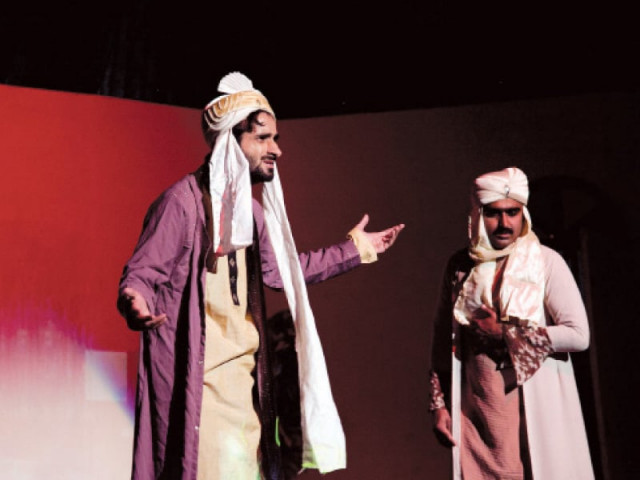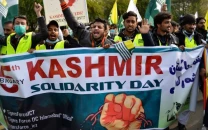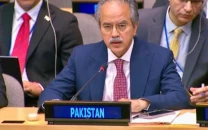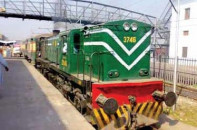Quaidians put on a remarkable show
It was a theatrical impression of changes that have shaped Pakistani discourse in the decades following Mughal rule.

The audience thoroughly enjoyed the comedy put together by QAU students at Rawalpindi Arts Council. PHOTO: MYRA IQBAL/EXPRESS
If Anarkali’s doting Prince Salim were to devise a time machine to observe present-day Pakistan, he would be fairly disillusioned. With this clever pretext in mind, on the third day of the ongoing “All-Punjab Inter-University Drama Festival”, the drama society of Quaid-i-Azam University wowed the audience at the Rawalpindi Arts Council (RAC) with its theatrical impression of the changes that have shaped Pakistani discourse in the decades following Mughal rule.
Ingeniously transporting its audience — which consisted largely of schoolchildren — across different epochs, the Quaidian Dramatic Club explored the starry-eyed narratives of the stately lovers Anarkali and Salim, rustic romantics Heer and Ranjha, electric onscreen duo Nadeem and Shabo, shifting inevitably to a subtle reference to homosexuality, in an overarching attempt to trace the disintegration of real values, and true love within an evolved nation.
On an almost bare stage, a despairing Shehzada Salim (Meher Ali Shah), jilted by the feisty Anarkali, commands his orderly, Maan Singh, to find him a time machine so that he can travel to an era more fitting for his passionate heart. A wide-eyed Maan Singh takes on the challenge and produces a comical missile-shaped contraption, urging the prince to embark on it by clinging onto the pole with all fours, throwing the audience into fits of laughter.
The curious prince is then lifted to the pastoral setting of Heer and Ranjha, whose song and dance sequence ends abruptly to reveal a chiding Heer and a disappointed Ranjha. Salim relates his observation to Singh, “Yeh Ranjha tou hum se bhi ziada zaleel ho raha hai”, and orders the machine to move forward in time, ending up in the tangles of a giddy Shabo and a double-dealing Nadeem, who also fall short of the prince’s expectations.
The year 2013 remains Salim’s final hope, though this is when he realizes that his search for love, and inherently humanity, has entirely slipped away from his reach. 2013’s Anarkali sings on her iPhone, and her boyfriend has another girlfriend. While the plot remains laced with satire and humour, its mood shifts when Salim’s disenchantment leads him to reflect on the current sorry state of society, where common decencies, compassion and insecurity have engendered the loss of culture, as it once existed in the courts of the Mughals. Trapped within the crumbling folds of a decadent society, Salim wishes to return but loses his contraption to a bomb blast.
Written by Nawaz Qaisrani and directed by Saad Sultan, the diverse characters were donned by a talented group of scholars enrolled in PhD and MPhil degrees at QAU, in an effort to raise awareness of the waning state of Pakistan’s affairs.
“The contemporary world has sidelined these important issues in the name of progress and independence,” expressed the 26-year-old director of the play, adding that while the theme of the play was potent and timely, it’s scripting and delivery was crafted in a way that it strayed from preaching.
“In the end we want to entertain our audience and give them something to think about later.”
Dramatic societies of twelve universities are participating in the six-day festival that aims to promote performing arts, which will continue until the 28th at the RAC auditorium, in two sessions at 10am and 11am.
The festival opened with the dramatic clubs of Arid Agriculture University (AAU), Rawalpindi’s play “Roti ki Khatir”, written by Attaullah and directed by Farrukh Iqbal; and Bahria University Islamabad’s “Soya Sher Kab Hoshyar Ho Ga”, written and directed by Hassan Mustafa on Saturday.
Addressing the opening ceremony AAU Vice-Chancellor lauded the RAC initiative in involving the youth in healthy activities. He stressed the need for arranging such activities.
He said that participation of universities from all over Punjab would help people understand cultural diversity and students would learn from each other’s experiences.
Published in The Express Tribune, November 26th, 2013.



















COMMENTS
Comments are moderated and generally will be posted if they are on-topic and not abusive.
For more information, please see our Comments FAQ